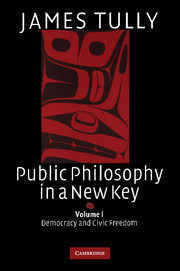Book contents
- Frontmatter
- Contents
- Acknowledgments
- Credits
- INTRODUCTION
- PART 1 APPROACHING PRACTICE
- PART 2 DEMOCRACY AND RECOGNITION
- 4 The agonistic freedom of citizens
- 5 Reimagining belonging in diverse societies
- 6 Multinational democracies: an introductory sketch
- PART 3 INDIGENOUS PEOPLES
- CONCLUSION
- Bibliography
- Index to Volume I
- IDEAS IN CONTEXT
5 - Reimagining belonging in diverse societies
Published online by Cambridge University Press: 05 September 2012
- Frontmatter
- Contents
- Acknowledgments
- Credits
- INTRODUCTION
- PART 1 APPROACHING PRACTICE
- PART 2 DEMOCRACY AND RECOGNITION
- 4 The agonistic freedom of citizens
- 5 Reimagining belonging in diverse societies
- 6 Multinational democracies: an introductory sketch
- PART 3 INDIGENOUS PEOPLES
- CONCLUSION
- Bibliography
- Index to Volume I
- IDEAS IN CONTEXT
Summary
INTRODUCTION
In Strange Multiplicity: Constitutionalism in an Age of Diversity, I suggested one way in which a sense of belonging could be reimagined for diverse societies. This involves, firstly, seeing the diverse cultural and national identities of citizens as overlapping, interacting and negotiated over time. Drawing on Wittgenstein, we can say that identities are ‘aspectival’. Secondly, reimagining belonging involves realising that the cultural and national identities that are worthy of respect often require some form of acknowledgment or recognition in the public life and institutions of a society in order to secure a sense of belonging. The actual forms of acknowledgment or recognition are various and mutable, and they must be worked out by citizens and their representatives by means of democratic discussions, agreements and periodic reviews.
I would now like to approach this field of study from the perspective of civic freedom introduced in Chapter 4. I wish to discuss the role that the democratic freedom of citizen participation plays in engendering a sense of belonging and the complex forms this freedom takes in multicultural and multinational societies, not only the freedom to participate in accord with one's cultural and national identities when they are publicly recognised (as I stressed in Strange Multiplicity), but also to participate in the on-going contests over how these are to be acknowledged, recognised and accommodated.
- Type
- Chapter
- Information
- Public Philosophy in a New Key , pp. 160 - 184Publisher: Cambridge University PressPrint publication year: 2008
- 1
- Cited by

